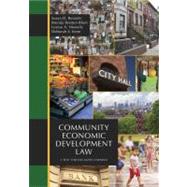Community Economic Development Law
, by Bennett, Susan D.; Blom, Brenda Bratton; Howells, Louise A.; Kenn, Deborah- ISBN: 9781594608186 | 1594608180
- Cover: Paperback
- Copyright: 8/1/2012
Community development law has assumed pre-eminence among strategies to alleviate entrenched poverty and create sustainable economic and social change within low income communities. Despite the growing prominence of community development within graduate schools and the helping professions, there is no comprehensive textbook to date. This text provides that resource. Community Economic Development Law: A Text for Engaged Learning provides a flexible set of materials that faculty can customize to meet the goals of the stand-alone community development class, or the pedagogical needs of community development law clinics. The text enables students to approach the substantive material as would problem-solving, community-based practitioners. They do so by entering the community of Ourfuture City, whose Old World immigrants built a vanished industrial prosperity; and of its neighborhood, Milkweed Park, whose new immigrants and long-time residents confront the stresses of physical and financial isolation, racial segregation and economic disinvestment. Students assume the roles of advisors and advocates for the families, teachers, clergy, bankers, entrepreneurs, non-profits, public institutions, and activists of this prototypical struggling municipality. The book intersperses overviews of substantive areas that are commonly encountered in community development advocacy with exercises and problems presented by the clients from Milkweed Park. Those areas include entity formation, economic development finance, housing, land use and the emerging field of community justice. The exercises use the substantive law to highlight skills that community development lawyers need to address their clients¿ problems and projects, as a basis for in-class discussion and/or preparation for client representation.







